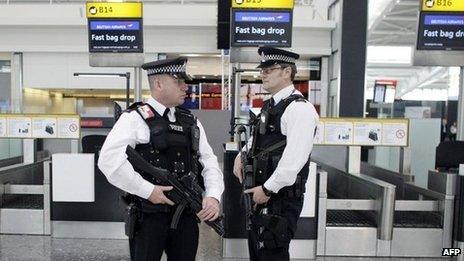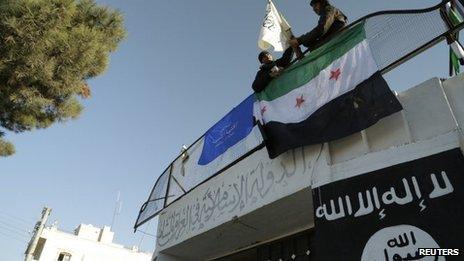What triggers a terrorism arrest?
- Published

The issue of Britons going to Syria is complicated for the authorities to deal with
Estimates vary on how many UK citizens have travelled to Syria to join jihadist militant groups, but the UK government is openly concerned it is only a matter of time before a radicalised minority return to carry out attacks.
To date, only a tiny handful of men have been arrested in the UK in connection with the Syrian conflict, although somewhere between 200 and almost 400 UK citizens are estimated to have gone to join jihadists. The vast majority have not come back.
Two cases are currently going through the courts concerning allegations of travelling to Syria for offences under counter terror legislation.
But what actually triggers a terrorism arrest? What is legal and what is not?
It is not illegal to travel to Syria, although the British government advises against it.
In fact it has been so easy to buy a cheap plane ticket to Turkey, then cross the porous border, where the Syrian authorities have lost control of key checkpoints and where no visa or passport stamp is involved, that an estimated 1,300 European jihadists have flocked there to fight. The true number may already be a lot higher.
Training camps
What matters in the eyes of the UK authorities is what an individual does when he gets to Syria. Does he, for example, attend "a terrorist training camp", or get involved in kidnapping and executions?
"It comes down to the advice given by the Crown Prosecution Service," said a senior Whitehall official, adding, "It is important to know who is using that camp."

Some al-Qaeda-linked groups are officially banned in the UK
Al-Qaeda-linked groups such as Jabhat Al-Nusra and Islamic State of Iraq and Sham (ISIS) are officially proscribed as "terrorist organisations", but the CPS says it does not keep a handy list of which groups raise alarm bells.
Instead, each case is looked at individually and often depends in practice on intelligence provided by the Security Service (MI5) or evidence gathered by the Metropolitan Police's Counter Terrorism Command (SO15).
To make an arrest, the police need to have reasonable grounds for suspicion that an individual has committed an offence under the Terrorism Act, namely that he or she "is or has been concerned in the commission, preparation and instigation of acts of terrorism".
David Anderson QC, the Independent Reviewer of Terrorism Legislation, says of those Britons arrested on their return from fighting in Syria, most are held under section 41 of the Terrorism Act 2000.
This requires only reasonable suspicion that a person "is a terrorist", defined as above. He says this is an unusual power because no suspicion is required of committing any specific crime. Suspects can be held for up to 14 days prior to charge, though very rarely more than a week.
On the ground
However, the issue of Britons going to fight in Syria is complicated. British government policy has been to call for the departure of Syria's autocratic President Assad and to support the weak, secular opposition.
But on the ground in Syria the most powerful, effective opposition forces are Islamist or jihadist, many with links to al-Qaeda. So the British authorities find themselves in the curious position of monitoring and sometimes arresting the very individuals who have been fighting the regime that they too oppose.
Deborah Walsh, deputy head of counter-terrorism at the CPS, says: "UK legislation allows us to prosecute in the UK terrorist offences that are committed abroad.
"Whilst prosecuting acts undertaken in countries such as Syria always brings new and unique challenges, the existing success of our specialist prosecutors in securing convictions for offences committed abroad - for example in Afghanistan, Pakistan and Somalia - demonstrates that we are ready and able to take these challenges on.
"We work with police from an early stage in the investigation to ensure that wherever possible, international borders and areas of conflict are not a barrier to justice."
With no end in sight for the Syrian conflict, and no sign of a let-up in the "pipeline" of British and European jihadists going out to fight there, the authorities are likely to be facing an ever-growing list of cases, many of which they may find hard to prosecute.
- Published20 December 2013
- Published7 November 2013